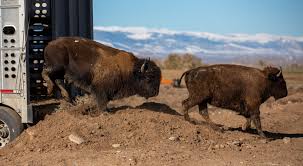
- Details
- By Native News Online Staff
On July 17, the InterTribal Buffalo Council, Native Americans in Philanthropy, The Nature Conservancy, and the World Wildlife Fund announced the launch of the Tribal Buffalo Lifeways Collaboration.
This groundbreaking partnership aims to stabilize, establish, and expand Tribal-led buffalo (bison) restoration, fostering cultural, spiritual, ecological, and economic revitalization within Native communities.
The initiative will work closely with the U.S. Department of the Interior and the Deparment of Agriculture to build on the momentum generated by Indigenous leaders, seeking to bring lasting structural change and restore buffalo to Tribal lands on an unprecedented scale.
The collaboration will provide necessary resources to support Tribal communities, including infrastructure improvements (such as fencing), training for herd managers, and access to land through co-stewardship, leasing, and acquisition.
“Buffalo are essential to the health, well-being, and prosperity of Native communities across Indian Country. We are pleased to support this collaboration of nonprofits and intertribal organizations to help Tribal communities further restore and create sustainable healthy buffalo herds on Tribal lands,” Wizipan Garriott, Principal Deputy Assistant Secretary for Indian Affairs at the Department of the Interior said in a press release. “Strong public and private sector partnerships such as this enhance Tribal ecosystem restoration projects and improve the cultural revitalization of buffalo in Tribal communities.”
Buffalo, as ecological and cultural keystone species, play a crucial role in numerous natural relationships across North America. Their restoration on Tribal lands is a vital step in repairing these relationships, which were intentionally severed by the United States government to enable European colonization and the subsequent violence against Native people and conversion of natural areas.
The InterTribal Buffalo Council (ITBC), a nationwide leader in buffalo restoration, supports 83 Tribes in managing more than 25,000 buffalo across 22 states, collectively managing over 10 percent of the nation’s buffalo population.
“Since 1992, ITBC has worked tirelessly to restore buffalo to Tribes and provide critical technical assistance for healthy herd management on extremely limited funds,” Ervin Carlson, President of ITBC said in a press release. "On behalf of the organization and its member Tribes, ITBC is grateful for this collaboration that has been inclusive of the Tribal vision for buffalo restoration and has the opportunity to provide meaningful funding to enhance Tribal restoration efforts."
Despite representing nearly 3 percent of the U.S. population, Native American communities receive less than 0.4 percent of U.S. philanthropic dollars. This Collaborative aims to address this disparity by bringing together Tribal values, ecological stewardship, and economic revitalization to increase funding and resources for cultural preservation and the restoration of Buffalo lifeways for future generations.
“This collaboration marks a historic milestone in our journey to restore buffalo to Tribal lands and revitalize Indigenous lifeways,” Erik Stegman, CEO of Native Americans in Philanthropy said in a press release. “By uniting our efforts, we are not only fostering ecological and cultural renewal but also ensuring that the leadership and vision of Native communities are at the forefront of this crucial work. Together, we can honor our traditions and pave the way for lasting economic and environmental benefits.”
The values, goals, and needs of InterTribal Buffalo Council’s members were foundational to this Collaboration, as articulated by herd managers during a September 2023 gathering. These commitments build upon an Order issued by Secretary of the Interior Deb Haaland to restore wild and healthy populations of buffalo and the prairie grassland ecosystems, utilizing more than $25 million from the Inflation Reduction Act.
With this new collaboration, the future of buffalo restoration and Native community revitalization looks brighter than ever, ensuring that the cultural and ecological lifeways associated with buffalo are preserved and strengthened for future generations.
More Stories Like This
NCAI Passes Two Emergency Resolutions on Immigration Enforcement ActivitiesChickasaw Lighthorse Police Officer named Indian Country Law Enforcement Officer of the Year
Indian Gaming Association Rallies Broad Coalition Against Sports Event Contracts It Calls Illegal Threat to Tribal Sovereignty
Navajo Resources and Development Committee Issues Notice on Livestock Inspection Requirements
American Prairie, Tribal Coalition Files Protest Over Rescinded Grazing Rights
Help us defend tribal sovereignty.
At Native News Online, our mission is rooted in telling the stories that strengthen sovereignty and uplift Indigenous voices — not just at year’s end, but every single day.
Because of your generosity last year, we were able to keep our reporters on the ground in tribal communities, at national gatherings and in the halls of Congress — covering the issues that matter most to Indian Country: sovereignty, culture, education, health and economic opportunity.
That support sustained us through a tough year in 2025. Now, as we look to the year ahead, we need your help right now to ensure warrior journalism remains strong — reporting that defends tribal sovereignty, amplifies Native truth, and holds power accountable.
 The stakes couldn't be higher. Your support keeps Native voices heard, Native stories told and Native sovereignty defended.
The stakes couldn't be higher. Your support keeps Native voices heard, Native stories told and Native sovereignty defended.
Stand with Warrior Journalism today.
Levi Rickert (Potawatomi), Editor & Publisher


